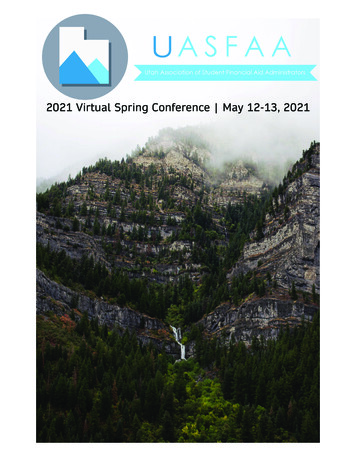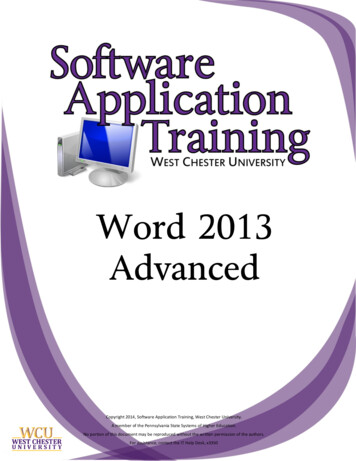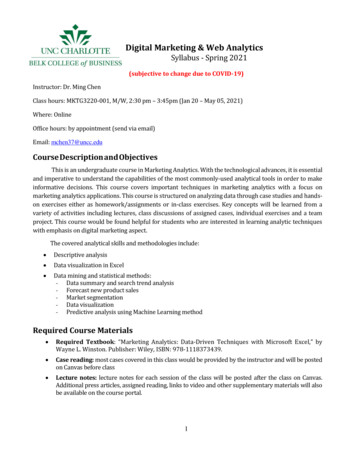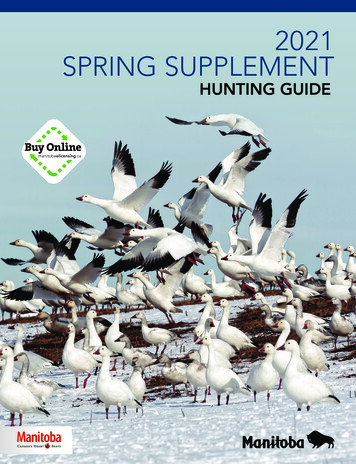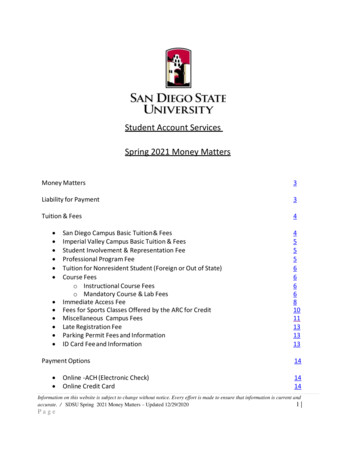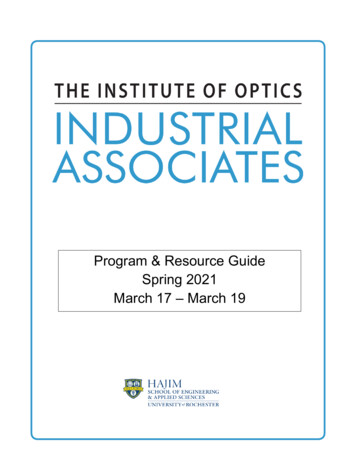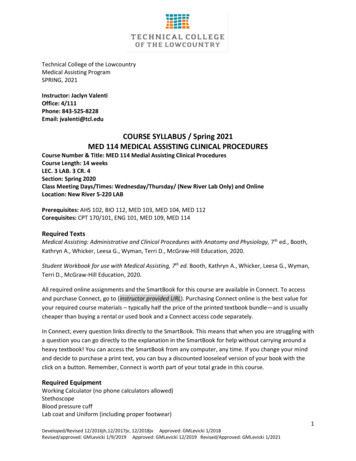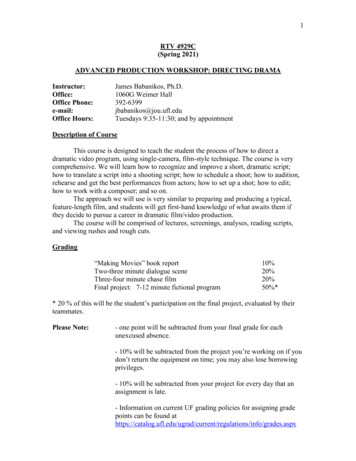
Transcription
1RTV 4929C(Spring 2021)ADVANCED PRODUCTION WORKSHOP: DIRECTING DRAMAInstructor:Office:Office Phone:e-mail:Office Hours:James Babanikos, Ph.D.1060G Weimer Hall392-6399jbabanikos@jou.ufl.eduTuesdays 9:35-11:30; and by appointmentDescription of CourseThis course is designed to teach the student the process of how to direct adramatic video program, using single-camera, film-style technique. The course is verycomprehensive. We will learn how to recognize and improve a short, dramatic script;how to translate a script into a shooting script; how to schedule a shoot; how to audition,rehearse and get the best performances from actors; how to set up a shot; how to edit;how to work with a composer; and so on.The approach we will use is very similar to preparing and producing a typical,feature-length film, and students will get first-hand knowledge of what awaits them ifthey decide to pursue a career in dramatic film/video production.The course will be comprised of lectures, screenings, analyses, reading scripts,and viewing rushes and rough cuts.Grading“Making Movies” book reportTwo-three minute dialogue sceneThree-four minute chase filmFinal project: 7-12 minute fictional program10%20%20%50%** 20 % of this will be the student’s participation on the final project, evaluated by theirteammates.Please Note:- one point will be subtracted from your final grade for eachunexcused absence.- 10% will be subtracted from the project you’re working on if youdon’t return the equipment on time; you may also lose borrowingprivileges.- 10% will be subtracted from your project for every day that anassignment is late.- Information on current UF grading policies for assigning gradepoints can be found s/info/grades.aspx
2TextRequired Text:Lumet, Sidney’s Making Movies (1999)Recommended Texts:Jane Barnwell’s The Fundamentals of Filmmaking (2008)Robert Del Valle’s The One-Hour Drama Series:Producing Episodic Television (2008)Edward Dmytryk’s On Screen Directing (1984)John Douglass and Glenn Harnden’s The Art of Technique:An Aesthetic Approach to Film and Video Production(1996)Robert Edgar Hunt’s Directing Fiction (2010)Nicholas Proferes’ Film Directing Fundamentals: See YourFilm Before Shooting (2008)Michael Rabiger’s Directing: Film Techniques andAesthetics (2003)University Policy on Accommodating Students with DisabilitiesStudents requesting accommodation for disabilities must first register with the Dean ofStudents Office (http://www.dso.ufl.edu/drc/). The Dean of Students Office will providedocumentation to the student who must then provide this documentation to the instructorwhen requesting accommodation. You must submit this documentation prior tosubmitting assignments or taking the quizzes or exams. Accommodations are notretroactive, therefore, students should contact the office as soon as possible in the termfor which they are seeking accommodations.On-Line Course EvaluationsStudents are expected to provide feedback on the quality of instruction in this coursebased on 10 criteria. These evaluations are conducted online at https://evaluations.ufl.edu.Evaluations are typically open during the last two or three weeks of the semester, butstudents will be given specific times when they are open. Summary results of theseassessments are available to students at https://evaluations.ufl.edu/results.University Honor CodeUF students are bound by The Honor Pledge that states:“We, the members of the University of Florida community, pledge to hold ourselves andour peers to the highest standards of honor and integrity by abiding by the Honor Code.On all work submitted for credit by students at the University of Florida, the followingpledge is either required or implied: ‘On my honor, I have neither given nor receivedunauthorized aid in doing this assignment.’The Honor Code ct-honor-code )specifies a number of behaviors that are in violation of this code and the possible
3sanctions.Furthermore, you are obligated to report any condition that facilitates academicmisconduct to appropriate personnel. If you have any questions or concerns, pleaseconsult with the instructor.Campus Resources: Health and WellnessU Matter, We Care:If you or a friend is in distress, please contact umatter@ufl.edu or 352 392- 1575 so that ateam member can reach out to the student.Counseling and Wellness Center: http://www.counseling.ufl.edu/cwc/Default.aspx, 3921575; and the University Police Department: 392-1111 or 9-1-1 for emergencies.Sexual Assault Recovery Services (SARS)Student Health Care Center, 392-1161.University Police Department, 392-1111 (or 9-1-1 for emergencies).http://www.police.ufl.eduAcademic ResourcesE-learning technical support, 352-392-4357 (select option 2) or e-mail to Learningsupport@ufl.edu. https://lss.at.ufl.edu/help.shtmlCareer Resource Center, Reitz Union, 392-1601. Career assistance and counseling.http://www.crc.ufl.eduLibrary Support, http://cms.uflib.ufl.edu/ask Various ways to receive assistance withrespect to using the libraries or finding resources.PrerequisitesRTV 3101 and RTV3320
4Tentative Course Schedule1/11/2021-intro to class-a very general discussion of the process involved in making a dramaticvideo/film.-The role of the director.-the various crew positions at work in a dramatic film, and what theirresponsibilities are.-Discussion of the final film project.o Assignment: book review of “Making Movies” assigned; due in threeweeks, 2/1/211/18/21-Martin Luther King, Jr. Day – N o c l a s s1/25/21-a review of video/film terminology, and how that affects the emotional,intellectual and psychological response to a single shot and an edited sequence.-How to cover a two-person scene.-break up into pairs for first two projects.o Assignment: shoot and edit 2-3-minute dialogue scene; due in two weeks,2/3/212/1/21-Writing the short script.-Editing techniques: some guidelines for effective editing.o Assignment: For next week, you will present (and hand in) a detailedsynopsis or outline or script for your final film. Ideally, you would breakup into groups of four and present one synopsis/outline/script for thegroup. But each of you need to be connected to a story. If not in a group offour, you can present as a group of three, or of two, or you can present onyour own. But you need to present and have something ready to hand in.
52/8/21-Dialogue exercises are screened-Final project pitches to the class. Break up into groups of four.-Go over chase film assignment.o Assignment: chase film, due in three weeks, 3/1/21o Assignment: First draft film script due in 10 days, Thursday, 2/18/212/15/21-Pre-production: location scouting, planning, auditions, and especially breakingdown the script into a shooting script.2/22/21-Individual meetings with groups to go over final scripts.3/1/21-Chase films due – view in class.-Developing a shooting script for the final films.3/8/21-Working with actors, and getting the best performances from them. Auditions will be held this week Friday, 3/12/21, from 2:00 –6:00 pm!3/15/21-Shooting the film – what goes on in the production stage.3/22/21-Post-production: continuity editing, split edits, sound mixing, the use of music,etc.3/29/214/5/21No formal class – students will be shooting their final film.
6-Individual group meetings to go over rough cut of final film.4/12/21-Individual group meetings to go over rough cut of final film.4/19/21-Screening of final films.
Recommended Texts: Jane Barnwell’s The Fundamentals of Filmmaking (2008) Robert Del Valle’s The One-Hour Drama Series: Producing Episodic Television (2008) Edward Dmytryk’s On Screen Directing (1984) John Douglass and Glenn Harnden’s . The Art of Technique: An Aesthetic Approach to Film and Video Production (1996) Robert Edgar Hunt’s . Directing Fiction (2010) Nicholas Proferes .
